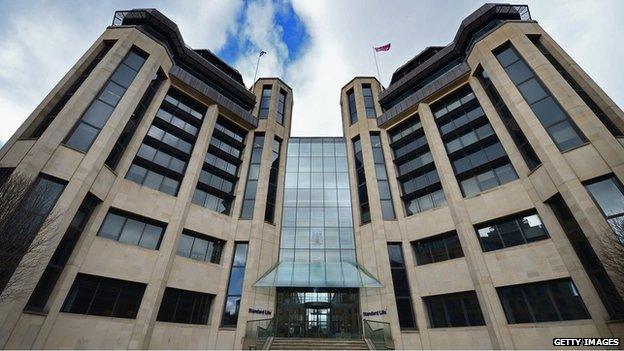How important is the financial sector to Scotland's economy?
- Published

Standard Life's headquarters could move from Edinburgh to London
Scotland has a long, rich history in the financial sector. Royal Bank of Scotland has been based there for nearly 300 years, while money manager Standard Life has had its headquarters in Scotland for 189 years.
But several Scottish-based financial institutions have now said they will relocate to England if Scottish voters back the break-up of the UK in next week's referendum on independence.
Uncertainty over the currency an independent Scotland would use, who would be the lender of last resort for Scottish banks and who would regulate them have led to concerns of "capital flight" - where deposits are moved out of the country.
Scottish First Minister Alex Salmond denied uncertainty in the markets was caused by the Scottish government's stance on a shared currency, and instead blamed "the unreasonable posture of the UK government who have refused to discuss this at any stage throughout the last two years".
So how important is the financial sector to Scotland's economy? And how does it compare with other sectors?

Financial and insurance activities account for 7.1% of gross value added (GVA) in Scotland - GVA being the value of all goods and services produced in an area.
It is the fifth biggest individual sector in Scotland, after manufacturing, retail, real estate and health (grouped with public administration and education in the chart above), according to the Office for National Statistics (ONS).
But finance and insurance makes up a larger part - 9% - of the rest of the UK, excluding Scotland and excluding things which cannot be allocated to regions, such as oil and gas revenues. However, if you also exclude London, the sector accounts for just 5% of GVA for the rest of the UK.

Although manufacturing is still the biggest contributor to the Scottish economy, the long-term trend has seen the sector shrink, while financial and insurance activities have grown in importance over the last couple of decades.
The sector was rising at such a pace that it almost overtook manufacturing in 2009. But the global financial crisis put a halt to that growth and in the years that followed, financial services' contribution to GVA fell back from that peak.

Scottish banks hold about £466bn in corporate and household deposits, roughly a quarter of all deposits held by UK banks, according to Deutsche Bank estimates. RBS and Bank of Scotland hold the bulk of those.
Of the £466bn, only £46bn is from Scottish customers.
Currently, the UK's Financial Services Compensation Scheme (FSCS) guarantees deposits of up to £85,000 so that customers are protected if banks get into trouble.
It is unclear what independence would mean when it comes to providing protection for savers, although the FSCS has said that a "transitional period" would be likely, external.

When it comes to personal financial products, Standard Life, for instance, has said that it could transfer pensions, investments and other savings held by UK customers to new regulated companies set up in England.
The vast majority of pensions, mortgages and individual savings accounts (Isas) sold by Scottish financial firms are held by non-Scottish customers.
If Scotland votes 'Yes' what would happen to the UK's assets and liabilities?

If Scotland votes to leave the UK, long and complicated negotiations will be needed to establish what share of the UK's assets and liabilities should be taken on by the newly independent state north of the border. For instance, there is as yet no clear consensus about how much of the UK's national debt properly belongs to Scotland.
The Government Expenditure and Revenue Scotland (GERS) report, published by the Scottish government, indicates that based on its share of the UK population, Scotland's share of debt would be £92bn, which is 62% of its estimated GDP.
But varying totals can be calculated using different assumptions, some indicating that Scotland's share would be as low as 38% of its GDP.
Scotland's two banking giants, Lloyds and RBS, also offer a complicated picture. Lloyds, which controls Bank of Scotland, is 25% owned by the British state, having been bailed out with taxpayers' money at the height of the global financial crisis.
RBS benefited from a similar rescue, but the size of the UK government's stake is even larger, at 81%.
It seems clear that an independent Scotland would face great difficulties in shouldering the burden if any of its financial institutions were to run into renewed trouble.
Bank of England governor Mark Carney has said that if Scotland were to keep its currency tied to sterling without monetary union, the Scottish government would need to accumulate financial reserves of tens of billions of pounds.
One ratings agency, Standard & Poor's, has suggested that if Scotland gained independence, it would not be able to support its banks in the event of another big financial crisis, since the sector has assets worth nearly 12-and-a-half times as much as its economic output.